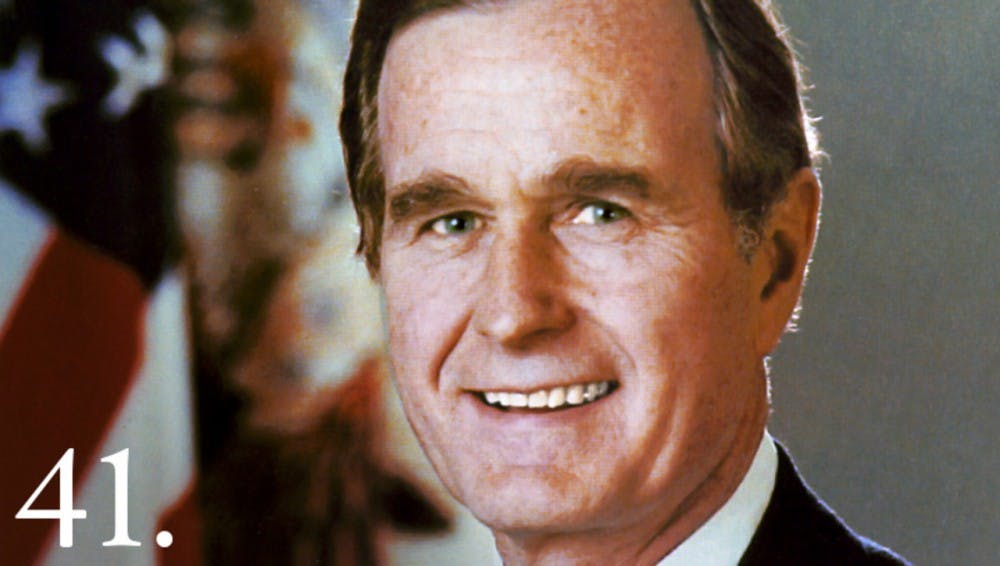
Former President George H. W. Bush on Nov. 30 died at his home in Houston, primarily due to complications from Parkinson's disease. Reflecting on his life of public service, I’m convinced that, despite not always agreeing with him ideologically, Bush’s character and conduct deserve praise and provide a much-needed role model for today’s politicians. What’s more, I’m worried that his story won’t be told.
Disturbingly, like many others observing the past week’s services, I wonder if Washington will ever recapture the essence of Bush’s ability to compromise and put the common good above party politics. This is at least partially because American voters today seem drawn to candidates who embody controversy and celebrity — the opposite traits that helped Bush successfully lead the nation.
As was borne out in the 2016 campaign cycle, scandal and sensationalism capture media attention like never before, and seem to translate into a frightening number of votes. Thoughtful discussions about policy and compromise do not. Until Americans reverse this nefarious trend by demanding more substance from the news media, we are likely to keep electing a great number more cantankerous and polarizing politicians to lead this country.
This media phenomenon has been building for decades and helps explain why Bush may sadly go down in history as “one of the most underrated presidents of all time.” It sometimes seems as though the more reserved Bush was overshadowed by the larger-than-life personalities of the men who preceded and followed him: Ronald Reagan and Bill Clinton. Reagan has been lionized by Republicans as a conservative icon, and Clinton, who was a bundle of contradictory accomplishments and personal scandals, takes up more than his fair share of the past presidential limelight.
Bush will likely not garner much of the public’s attention for long after the current memorials because the media focuses on and the American public loves consuming stories about individuals who lead colorful lives more than those who govern with a steady hand. This means that the lessons of Bush’s life are and will likely remain lost to many Americans.
This is a shame. The quiet legacy of George H.W. Bush deserves a great deal of attention, as it represents precisely the political civility our country is most desperately in need of today. As pointed out by Ed Rogers in The Washington Post, there “is a lot about President George H.W. Bush that we miss” in Washington and “the current occupant of the White House puts into vivid relief the things that we will miss the most.”
It is vital that Americans reflect upon the differences between Bush and our current president. The media needs to emphasize that while Trump dubiously avoided fighting in Vietnam with claims of “bone spurs,” Bush interrupted his education at Yale University to enlist after Japan’s attack on Pearl Harbor. At 19, Bush was one of the youngest aviators in the entire Navy. And as compared to our current president, who built his alleged fortune on often shady real estate deals and his media persona by firing people on reality TV, Bush came to office with extensive experience in Congress, the United Nations, the Foreign Service, leading the CIA, and being Reagan’s vice president.
As a result of his experience and character, Bush was a remarkably accomplished president, particularly concerning foreign policy. He was able to cleverly and diplomatically negotiate a gracious end to the Cold War without antagonizing the defeated Soviets. Once Saddam Hussein invaded Kuwait in 1990, Bush deftly assembled a coalition of dozens of countries to successfully repel the Iraqi forces. Here at home, Bush “passed more major domestic legislation that any American president other than Lyndon Johnson and Franklin Roosevelt,” including the 1991 Civil Rights Act, the Clean Air Act, and the Americans With Disabilities Act.
Of course, he wasn’t perfect. In his 1988 campaign against Democrat rival Michael Dukakis, Bush used a disturbingly race-baiting attack ad to paint his opponent as weak on crime. As president, he was woefully slow in responding to the growing epidemic of the AIDS crisis. Bush also controversially pardoned many individuals involved in the infamous Iran-Contra scandal, in which many senior members of the Reagan administration illegally sold weapons to Iran, which was under an arms embargo.
Yet despite all this, I hope history will be kind to Bush. After losing his 1992 campaign for reelection to the charismatic Bill Clinton, he left his successor this note:

Dear Bill,
When I walked into this office just now I felt the same sense of wonder and respect that I felt four years ago. I know you will feel that, too.
I wish you great happiness here. I never felt the loneliness some Presidents have described.
There will be very tough times, made even more difficult by criticism you may not think is fair. I’m not a very good one to give advice; but just don’t let the critics discourage you or push you off course.
You will be our President when you read this note. I wish you well. I wish your family well.
Your success now is our country’s success. I am rooting hard for you.
Good Luck — George
Something makes me think Trump won’t be leaving a similar letter to his successor.

SPENCER SWANSON is a College sophomore from London, studying political science. His email address is sswanson@sas.upenn.edu.
The Daily Pennsylvanian is an independent, student-run newspaper. Please consider making a donation to support the coverage that shapes the University. Your generosity ensures a future of strong journalism at Penn.
Donate







